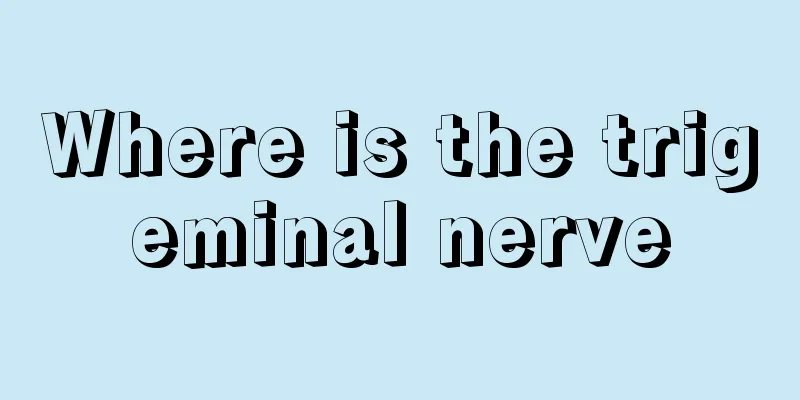Where is the trigeminal nerve

|
The term trigeminal neuralgia is often seen on TV programs or in various advertisements, but many people do not understand what kind of disease or pain these four words mean. Even the person experiencing the pain isn't exactly sure where it's located, but when the pain comes in waves, it can be hard to ignore. So where exactly is the trigeminal nerve? What is the so-called trigeminal neuralgia? What are the different manifestations? What are the dangers of trigeminal neuralgia? I believe that many people who have these symptoms or whose family members have these symptoms have these questions. The trigeminal nerve (n.trigminus) is a mixed nerve, a large cranial nerve (the 5th cranial nerve), containing both general somatic sensory fibers and special visceral motor fibers. Special visceral motor fibers originate from the trigeminal motor nucleus, and their axons constitute the trigeminal motor root. They exit the brain at the transition point between the ventral surface of the pons and the middle cerebellar peduncle, are located on the anteromedial side of the sensory root, and are distributed along the mandibular nerve to the masticatory muscles, etc. The cell bodies of general somatic sensory fibers are concentrated in the trigeminal ganglion, which is located in front of the trigeminal nerve impression at the tip of the petrous part of the temporal bone. The trigeminal ganglion is composed of pseudomonopolar neurons, whose central processes gather into a thick trigeminal sensory root, which enters the brain from the ventral side of the pons and ends at the trigeminal pontine nucleus and trigeminal spinal nucleus. Its peripheral processes are distributed on the skin of the head and face and the mucous membranes of the eyes, nose and mouth. Different manifestations may occur depending on the location of trigeminal nerve injury: When the trigeminal nerve is injured above the semilunar ganglion: general loss of sensation in the skin of the head and face, as well as the tongue, mouth, and nasal mucosa on the affected side; disappearance of the corneal reflex; paralysis of the masticatory muscles on the affected side, and the mandible deviates to the affected side when the mouth is opened. When the trigeminal nerve is damaged below the semilunar ganglion, symptoms of damage to each individual branch may appear. When the ophthalmic nerve is damaged, sensory impairment of the skin above the palpebral fissure on the affected side occurs, and the corneal reflex disappears. From the above introduction, we can understand that the trigeminal nerve is the fifth pair of cranial nerves. Its specific location still needs to be located by a doctor. After all, none of us graduated from medical school. The purpose of knowing relevant information is just to appear more professional when the doctor is explaining something, so as to avoid interrupting the doctor's explanation. Therefore, a professional doctor is very necessary. |
Recommend
What are the causes of lumps inside the breast?
The probability of breast diseases has been risin...
Which virus may cause prostate cancer?
A study published by US researchers shows that a ...
How much is the cost of postoperative radiotherapy for endometrial cancer
Endometrial cancer is a common disease and cancer...
What is the reason for the soreness and heaviness in the calves? The harm is so serious
Traditional Chinese medicine believes that it is ...
What is femoral artery atherosclerosis
Femoral artery atherosclerosis is also a type of ...
Do you know the four major clinical manifestations of aortic dissection?
When abnormalities occur in the body's arteri...
The difference between Hodgkin's lymphoma and non-Hodgkin's lymphoma
As we all know, lymphoma, also known as lymphoma,...
A practical list of must-have items for newborns
Many young parents feel very excited when their b...
Western medicine for cooling blood
In summer, the weather is hot and people like to ...
How to conduct follow-up examination after thyroid cancer surgery? Will thyroid cancer recur after surgery?
After thyroid surgery, a follow-up examination sh...
The diagnosis of kidney cancer is of decisive significance
Kidney cancer is a malignant tumor that occurs in...
Boys with slanted chin
If a boy is called good-looking, he must have reg...
Specific medicine to kill Helicobacter pylori
Helicobacter pylori is a bacterium that is diffic...
Can sea cucumbers be eaten with potatoes?
Sea cucumbers are very popular, and there are man...
Can honey and fermented glutinous rice be eaten together?
Eating is something we have to do every day. Ther...









